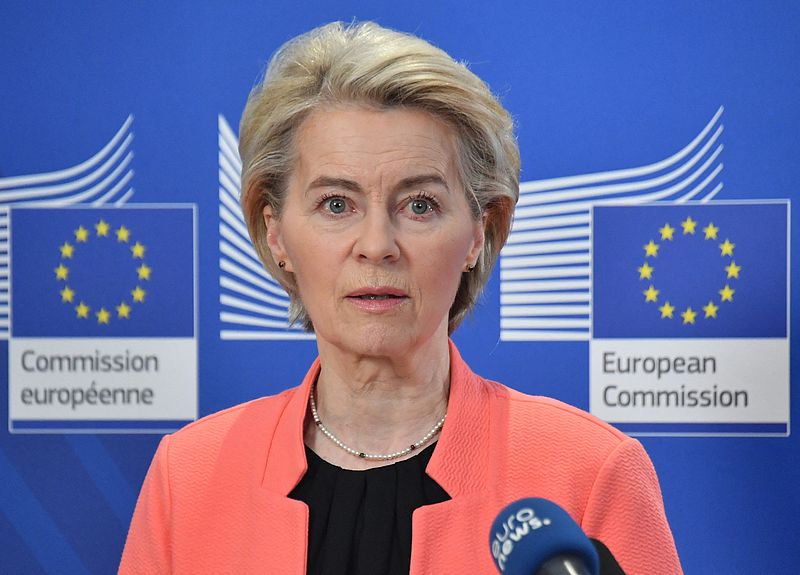BRUSSELS - European leaders on Thursday hit out at sweeping new U.S. tariffs, with the EU saying it was ready to respond with countermeasures while opening the door for final negotiations. On Wednesday, U.S. President Donald Trump announced a 20 percent tariff on the European Union as part of sweeping levies on imports that have sparked fears of a global trade war. Trump has previously imposed tariffs on European steel and aluminium imports, as well as on cars and auto parts.
Ursula von der Leyen, the head of the 27-member bloc, called the tariffs "a big blow to the world economy" and said Brussels was "preparing for further countermeasures." and continues "I deeply regret this decision," von der Leyen said on a visit to Uzbekistan. "There seems to be no order in this mess. No clear path through the complexity and chaos that is being created because all US trading partners are being affected."
But she said "it is not too late to address concerns through negotiations" and called for a cool response to the tariff threat the bloc faces. Germany has backed the push for a "negotiated solution", but Economy Minister Robert Habeck said the EU was ready to provide a "balanced, clear and decisive response" if negotiations fail. In France, President Emmanuel Macron is due to meet leaders of industries hit by the tariffs, and government spokeswoman Sophie Primas said the bloc was "ready for a trade war" and planned to "attack online services". Although Britain is no longer a member of the EU, she said she hoped the economic deal would "mitigate" the impact of the 10 per cent tariff Trump is imposing on the UK.
"Last night the President of the United States acted in the best interests of his country, and that is his mandate. Today I will act in Britain's interests with mine," British Prime Minister Keir Starmer told business chiefs in his Downing Street office on Thursday, adding that trade talks with the Trump administration would continue and that "we will fight for the best deal for Britain". He stressed that "nobody wins in a trade war" and pledged to respond "pragmatically, with cool and calm heads". Prime Minister Keir Starmer told business that "it is clear that there will be an economic impact" but that the government would "fight for the best deal".
Italian Prime Minister Giorgia Meloni called the new tariffs "bad" and said the bloc would do everything in its power "to work on an agreement with the United States in order to avoid a trade war that would inevitably weaken the West in favour of other global players".
Its foreign minister, Antonio Tajani, said he would meet EU trade chief Maroš Sefcovic in Brussels on Thursday to discuss a response "based on a pragmatic approach and dialogue". After Switzerland was hit with tariffs of 31 %, President Karin Keller-Sutter said the government would quickly decide on next steps, adding that respect for international law and free trade were "essential". Polish Prime Minister Donald Tusk said that friendship with the United States means partnership and therefore it is necessary to introduce "truly and genuinely reciprocal tariffs".
There are also concerns in Europe that Trump's higher tariffs will lead to an influx of cheap goods from other countries. Bernd Lange, who heads the European Parliament's trade committee, condemned Trump's "unjustified, illegal and disproportionate measures". European industry groups have called Trump's move counterproductive for countries and consumers. The German Association of the Automotive Industry said the tariffs "will only create losers" and called on the EU to act "with the necessary force while continuing to signal its willingness to negotiate".
The German Chemical Industry Association called on the EU to "keep a cool head" and warned that "a spiral of escalation would only increase the damage". Since Trump's return to office in January, the EU has already been hit by several announcements on US tariffs, including a 25 per cent tariff on car imports that came into force on Thursday. The bloc's manufacturers have also been hit by a 25 percent U.S. tariff on steel and aluminum from around the world, for which Brussels has already promised countermeasures to take effect in mid-April. US Treasury Secretary Scott Bessent has warned countries not to retaliate. "Sit down and take it," he told Fox News television. "Because if you take retaliatory measures, there will be escalation."
CMG/gnews.cz-jav



